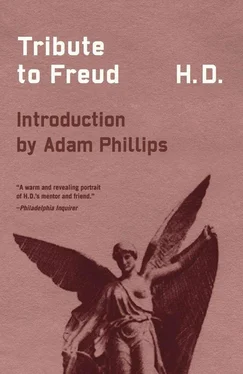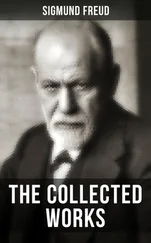Even I could search Vienna for a single gardenia or a cluster of gardenias. But I could not find them. Another year, I wrote from London, asking a friend in Vienna — an English student there — to make a special effort to find a cluster of gardenias for the Professor’s birthday. She wrote back, “I looked everywhere for the gardenias. But the florists told me that Professor Freud liked orchids and that people always ordered orchids for his birthday; they thought you would like to know. I sent the orchids for you.”
It was sometime later that the Professor received my gardenias. It was not a birthday, it was not Vienna. I had been to see him in London, in new surroundings. He had arrived lately, an exile. It was a large house with a garden. There had been much discussion and anxiety concerning the Professor’s famous collection of Greek and Egyptian antiquities and the various Chinese and other Oriental treasures. The boxes had at last arrived, although the family expressed some doubt as to whether or not the entire treasure-trove, or even any of it, would be found intact. At least, the boxes had come, due to the influence and generosity of the Professor’s friend and disciple, Madame Marie Bonaparte, the Princess George of Greece; “the Princess” or “our Princess,” the Professor called her. I had expressed surprise at seeing several Greek figures on his desk. It seemed to be the same desk in a room that suggested that summer room in the house outside Vienna of my first visit in 1933. But this was autumn 1938. “How did you manage to bring those from Vienna?” I asked him. “I did not bring them,” he said. “The Princess had them waiting for me in Paris, so that I should feel at home there.” It was a treacherous, evil world but there was yet loyalty and beauty in it. It had been a flying, frightening journey. He had told me, five years before in Vienna, that traveling was even then out of the question for him. It was distinctly forbidden him by the distinguished specialist who was always within beck and call. (If I am not mistaken, this devoted friend accompanied the Professor on his journey across the Continent.) It was difficult, seeing the familiar desk, the familiar new-old images on the desk there, to realize that this was London. Indeed, it was better to think of it in terms of a temporary slightly familiar dwelling, as that summer house at Döbling. This pleasant district was geographically, in a sense, to London, what Döbling had been to Vienna. But there was no return to Berggasse, Freudgasse that was to have been.
But in imagination at least, in the mist of a late afternoon, I could still continue a quest, a search. There might be gardenias somewhere. I found them in a West End florist’s and scribbled on a card, “To greet the return of the Gods.” The gardenias reached the Professor. I have his letter.
20 Maresfield Gardens,
London, N. W. 3
Nov. 28th, 1938
Dear H. D.,
I got today some flowers. By chance or intention they are my favourite flowers, those I most admire. Some words “to greet the return of the Gods” (other people read: Goods). No name. I suspect you to be responsible for the gift. If I have guessed right don’t answer but accept my hearty thanks for so charming a gesture. In any case,
affectionately yours,
Sigm. Freud
I only saw the Professor once more. It was summer again. French windows opened on a pleasant stretch of lawn. The Gods or the Goods were suitably arranged on ordered shelves. I was not alone with the Professor. He sat quiet, a little wistful it seemed, withdrawn. I was afraid then, as I had often been afraid, of impinging, disturbing his detachment, of draining his vitality. I had no choice in the matter, anyway. There were others present and the conversation was carried on in an ordered, conventional manner. Like the Gods or the Goods, we were seated in a pleasant circle; a conventionally correct yet superficially sustained ordered hospitality prevailed. There was a sense of outer security, at least no words were spoken to recall a devastatingly near past or to evoke an equivocal future. I was in Switzerland when soon after the announcement of a World at War the official London news bulletin announced that Dr. Sigmund Freud, who had opened up the field of the knowledge of the unconscious mind, the innovator or founder of the science of psychoanalysis, was dead.
I had originally written had gone, but I crossed it out deliberately. Yes, he was dead. I was not emotionally involved. The Professor was an old man. He was eighty-three. The war was on us. I did not grieve for the Professor or think of him. He was spared so much. He had confined his researches to the living texture of wholesome as well as unwholesome thought, but contemporary thought, you might say. That is to say, he had brought the past into the present with his the childhood of the individual is the childhood of the race — or is it the other way round? — the childhood of the race is the childhood of the individual. In any case (whether or not, the converse also is true), he had opened up, among others, that particular field of the unconscious mind that went to prove that the traits and tendencies of obscure aboriginal tribes, as well as the shape and substance of the rituals of vanished civilizations, were still inherent in the human mind — the human psyche, if you will. But according to his theories the soul existed explicitly, or showed its form and shape in and through the medium of the mind, and the body, as affected by the mind’s ecstasies or disorders. About the greater transcendental issues, we never argued. But there was an argument implicit in our very bones. We had come together in order to substantiate something. I did not know what. There was something that was beating in my brain; I do not say my heart — my brain. I wanted it to be let out. I wanted to free myself of repetitive thoughts and experiences — my own and those of many of my contemporaries. I did not specifically realize just what it was I wanted, but I knew that I, like most of the people I knew, in England, America, and on the Continent of Europe, was drifting. We were drifting. Where? I did not know but at least I accepted the fact that we were drifting. At least, I knew this — I would (before the current of inevitable events swept me right into the main stream and so on to the cataract) stand aside, if I could (if it were not already too late), and take stock of my possessions. You might say that I had — yes, I had something that I specifically owned. I owned myself. I did not really, of course. My family, my friends, and my circumstances owned me. But I had something. Say it was a narrow birch-bark canoe. The great forest of the unknown, the supernormal or supernatural, was all around and about us. With the current gathering force, I could at least pull in to the shallows before it was too late, take stock of my very modest possessions of mind and body, and ask the old Hermit who lived on the edge of this vast domain to talk to me, to tell me, if he would, how best to steer my course.
We touched lightly on some of the more abstruse transcendental problems, it is true, but we related them to the familiar family-complex. Tendencies of thought and imagination, however, were not cut away, were not pruned even. My imagination wandered at will; my dreams were revealing, and many of them drew on classical or Biblical symbolism. Thoughts were things, to be collected, collated, analyzed, shelved, or resolved. Fragmentary ideas, apparently unrelated, were often found to be part of a special layer or stratum of thought and memory, therefore to belong together; these were sometimes skillfully pieced together like the exquisite Greek tear-jars and iridescent glass bowls and vases that gleamed in the dusk from the shelves of the cabinet that faced me where I stretched, propped up on the couch in the room in Berggasse 19, Wien IX. The dead were living in so far as they lived in memory or were recalled in dream.
Читать дальше











